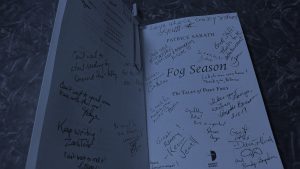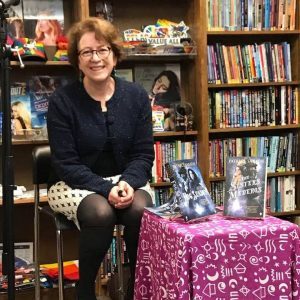Patrice Sarath's Blog, page 8
April 8, 2019
Guest post: Amanda Bridgeman
I’m excited to bring you a guest post from Australian author Amanda Bridgeman. She was kind enough to answer a few questions from me and share an excerpt from her novel, The Subjugate. Welcome, Amanda! Thanks for coming by to talk about writing and your process.
What makes you write?
Ultimately, it’s the desire to communicate thoughts and feelings, and to connect with others. I write to entertain and move people, so if readers enjoy my books, I’m a very happy writer!
What about this book compelled you to write it?
My two favourite genres are sci-fi and thrillers (be it psychological, crime, suspense, etc) and I’d always wanted to write a cop character, so this story enabled me to meld these together. In terms of worldbuilding, the Solme Complex came to me quite strongly, and I wanted to explore this interesting world of horrendous criminals turned into saints. And the plot itself enabled discussions on violence against women, religion and technology, and the impact – and control – each of these can have on our lives.
What are the themes or motifs readers will always find in your work, and did these same motifs take you by surprise?
At the heart of my stories there is a hero or heroine who tends to tough it out alone but who eventually realise that it’s okay to be weak sometimes and to lean on and accept help from others. This feeds into a ‘teamwork’ theme that threads through many of my stories. We can fight battles alone, or we can team up together and share our strengths and weaknesses to overcome the bad. We can be strong alone, but we are much stronger when we fight together.
My heroines are often fighting to prove themselves in a man’s world, and my heroes are often trying to be the best men they can, but like any human, sometimes they struggle to live up to the expectations placed upon them.
The strongest theme across all my books, would be the subject of control and how we as humans will either succumb to (and even crave) being controlled by another, or will fight vehemently against it.
These themes/motifs didn’t really surprise me at all. As a writer you can’t help but leave your fingerprints in the text of your stories, and that’s what makes readers respond to your work. You offer them an entertaining story with a part of yourself inside, and the ones that identify with that voice, that part of yourself, will connect with it as you had intended.
Extract:
 “So,” Salvi said, pulling Hernandez’s attention back. “Stan. How’s he doing?”
“So,” Salvi said, pulling Hernandez’s attention back. “Stan. How’s he doing?”
“He’s doing good. You should go see him sometime. I think the old guy would appreciate that.” He glanced over to the empty desk opposite hers. “Where’s your new partner at?”
Salvi checked the time on her police-issued iPort, a thick data-enabled wrist cuff. “He can’t be too far.”
“How’s he been doing?” Hernandez’s eyes sharpened on hers. “It’s been nearly four months. You must have a good feel for him by now.”
“He’s doing fine.”
“Really? Seems to me he’s been drinking a bit.”
Salvi went to respond but Ford called out from her office. “Brentt and Grenville! You’re up!”
“The boss calls,” she said to Hernandez, then stood and glanced at Mitch’s empty desk, wondering where the hell her partner was. Hernandez checked his iPort and pursed his lips, just as Mitch finally walked in.
She caught her partner’s eye. “Ford’s office.”
Mitch nodded as he made his way toward her with two takeout cups of coffee in hand. He held one out for her and she took it. For whatever reason, every morning he brought her a coffee. At first she thought it was just a gesture from one new partner to another, but three and a half months had now passed and he was still bringing her one every day. She wasn’t complaining.
“What’s up?” he asked, pulling his dark wrap-around shades onto his head.
“You’re late,” Hernandez said, studying him. “Big night?”
Mitch’s hair was still wet from a shower, his face unshaven, his eyes a little bloodshot, but he smelled of aftershave and mints. He smiled and pointed at Hernandez. “You’d make a good detective you know that?”
Salvi grabbed him by the arm and ushered him toward Ford’s office before Hernandez could respond.
They found Ford sitting at her pristine desk, which was empty aside from her console display, a hologram of her wife and kids, and a cup of what smelled like Strawberry Cofftea. Back in the day she was attractive, athletic and known to hold her own in the field and in a fight, but now she carried a little extra weight and the stress of being Detective Lieutenant.
Salvi eyed the large glass screen affixed to the wall behind Ford, displaying a map of the city with various lights glowing and flashing, indicating the current location of all callouts. She wondered which one would be theirs.
“Don’t get too comfortable,” Ford said as they took a seat in the guest chairs, her light blue eyes fixed on her console’s display. “You got a drive ahead of you.”
“We’re we going?” Salvi asked.
“The body of a young female has been found inside her home in the unincorporated community of Bountiful, just outside the city. Looks pretty nasty and the Sheriff’s office is small, so they don’t have the manpower to work it. Weston and Swaggert will be handling the forensics. They’re already on their way. This is a first for the community so it’s big news. You heard about Bountiful, right? It’s one of the tech-pullaways.”
“Survivalist or religious?” Salvi asked.
“Religious,” Ford said. “But Bountiful was founded before the Crash.”
“How religious?” Salvi asked. “Cult-religious?”
“Cult’s a pretty strong word,” Ford said. “Let’s go with extremely devout.”
“I think I heard about that place,” Mitch said. “Bountiful is the one next door to the Solme Complex, right?”
“Yeah,” Ford said, resting her elbows on the table. “I need you to get out there and get a handle on it. Let’s be discreet on this one. We want to keep the media out of things if we can. The first place people will be looking to throw blame is the Solme Complex given what it houses. We need to manage that. From everything I hear, the place is doing good work and the people of Bountiful have accepted them. But I guess you never know. So, get out there, see what you can find out.” She turned back to her console and tapped at the screen. “I just uploaded the case file to your accounts. The contact out there is Sheriff Holt. He’s expecting you.”
Mitch stood and tapped his iPort, checking the information had come through. “We’ll get on it,” he said.
“Maybe use the autodrive today, huh?” Ford said studying him carefully.
Mitch looked back at her.
“I can see the red in your eyes from here, Grenville,” Ford said, “and I know it’s not your comms lenses.”
“I’m fine to drive,” he said.
“Next time use some drops for Christ’s sake. At least try and hide it.”
Mitch didn’t say anything, but gave a nod then turned and left the room, his long black coat swishing behind him.
Salvi watched him leave as she stood, then glanced back at Ford.
“He doing OK?” Ford asked.
“Seems to be,” she said with a shrug.
“Keep an eye on him, huh?”
Salvi eyed Ford curiously. “Something I should know?”
Ford shook her head and looked back at her display. “Just making sure the new guy is settling in.”
About Amanda:
Amanda is an Aurealis Award finalist and author of several science fiction novels, including the best-selling space opera/military SF Aurora series, alien contact drama The Time of the Stripes, and sci-fi crime thriller The Subjugate.
Born in the seaside/country town of Geraldton, Western Australia, she moved to Perth (Western Australia) to study film & television/creative writing at Murdoch University, earning her a BA in Communication Studies. Perth has been her home ever since, aside from a nineteen-month stint in London (England) where she dabbled in Film & TV ‘Extra’ work.
Amanda is currently working on more novels, as well as screenplays, in a variety of genres.
Links:
http://amandabridgeman.com.au/
Amazon/Apple, etc:
http://smarturl.it/TheSubjugate
Kobo:
https://www.kobo.com/ca/en/ebook/the-subjugate
Google Play:
Twitter:
https://twitter.com/Bridgeman_Books
Facebook:
March 18, 2019
A miscellany of notes, observations, and announcements
Notes: Fog Season has been out for a few months now and has garnered some excellent buzz. If sisters getting into and out of trouble with magic and mayhem is your cup of tea, please give Fog Season and The Sisters Mederos a try.
Here is a collection of interviews I’ve done since Fog Season came out:
Author Spotlight: Fantasy Hive
Special Guest Appearance: Patrice Sarath
Guest Blogger: Patrice Sarath
Guest Blogger: Patrice Sarath
Observations: The story a week challenge bogged down, but I still finished the most recent story. At this stage I have written 8 stories since January 1. I will get back on track this week. I’ve discovered a few things — wow, can I write myself in a corner. Also, some of the best bits have come because I literally don’t know what to write next, and I throw myself on the mercy of my muse. I also have gained some insights about storytelling, pacing, structure, and more.
Announcements: Upcoming appearances below!
BOOKPEOPLE MARCH 30, 5 P.M.
I will be appearing with Amber Royer, author of Free Chocolate and Pure Chocolate, and Nicky Drayden, author of Temper and Prey of Gods. It will be a Texas women in SFF.
MURDER BY THE BOOK APRIL 13, 4:30 PM. HOUSTON, TX
I will be appearing with Amber Royer. This will be an Angry Robot authors event!
March 7, 2019
Welcome to the Chocoverse! An interview with Amber Royer
Amber Royer is the author of Free Chocolate and Pure Chocolate, out now from Angry Robot Books. Pure Chocolate just hit the shelves and ereaders, and Amber is here to talk about her writing life. Check out the awesome book trailer for Pure Chocolate.
Welcome, Amber, to the Gordath Wood website. Let’s get started.
What was the worst bit of writing advice you ever received? What was your reaction?
Once you finish writing the novel, send it out, and if nobody wants it, move on to the next book. Oh, I took that advice, and I took it hard. I’d send a project to a half dozen people, get no’s and decide that the project was so flawed, I’d move on to the next book. That’s how Free Chocolate wound up in a trunk for years before I decided there was something about the story that I just couldn’t give up on. And why I have 20 plus years of writing experience and fourteen manuscripts, and I’m still new at the “published author” table.
What they meant was, Don’t make your first novel the only thing you ever write. But you have to go through the learning process of making a first draft into something salable. Otherwise, you can write books your whole life, but none of them will be polished and structurally sound. A number of years into the whole submission process, after I’d given up on becoming a published author and then reluctantly come back to try again, an agent (not the one I eventually signed with) told me, “You keep submitting things two drafts too soon.” THAT is the advice that changed everything. I realized how much about the writing process I didn’t know, and how little of the practical side of it had been addressed in the creative writing classes I’d taken for my undergrad work. I started reading writing manuals, listening to podcasts and learning the craft. My favorite writing quote is where Hemingway said, “We are all apprentices in a craft where no one ever becomes a master.” I started viewing myself as an apprentice and learned from many, many more experienced writers.
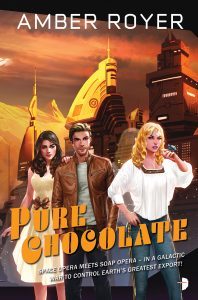 When did you call yourself a writer? What made you realize you were a writer?
When did you call yourself a writer? What made you realize you were a writer?
I joined my first adult-level writer’s group when I was still in high school, so I can’t really remember not thinking of myself as a writer. I’m pretty sure the group thought of me as the kid mascot (I remember winning some contest where the prize was a bottle of wine, and not being allowed to keep it), but I learned so much. BUT I think because I was a kid, a lot of people didn’t give me the blunt advice they would have an older writer, and I thought I was brilliant, because I got smilies on my work at critique group and A’s from my creative writing professors. I think that’s one reason it took me so much to publish (see above).
What surprised you the most about your novel and why?
Brill. (This is a little bit of a spoiler, but not terribly so, since he is on the cover of Book 2). When I originally drafted the novel, he was supposed to be just as much of a self-centered jerk as Bo takes him for in the middle of Free Chocolate. Their breakup was supposed to be permanent. But once I started writing it, I realized there was so much more to him than I’d given him credit for. And so much more to his planet’s culture. His sense of honor and determination to do the right things for Bo, even if it didn’t win her back – I hadn’t planned that. And I didn’t accept it at first. I tried to shoehorn that first draft into the shape I had originally envisioned, with Bo making predetermined choices, and that rang false. The manuscript didn’t even make it to critique readers before I realized I had to change it.
Nanowrimo– for or against? Prove your work.
Definitely for. As a writing instructor, I find that the hardest thing for a student to do is complete their first novel. Often, they get caught up in overthinking each step of the process, or get overwhelmed at the enormity of the task. NaNo forces you to get the work done, and then you realize you CAN complete a novel. There’s no guarantee it will be a very good novel, or that 50,000 words will even be the whole story, but you can’t edit what you didn’t write. And even if you don’t “win,” you will have a significant number of words you didn’t have before.
HOWEVER, walking into NaNo blind and deciding on November 1 to just sit down and start typing without counting the cost of the task is setting yourself up for failure. For a new writer, this can be extremely discouraging. Try writing for a fifteen minute sprint. Do this four or five times and take an average. Then multiply this by four, and that’s your average sprinting wordcount per hour. Take 50,000 and divide by your average per hour speed, and add a couple of hours for time taken figuring out plot issues, celebrating epiphanies that take your work to a whole new level, and unexpected “life happens” moments. That’s what you’re committing to. If the number of hours is honestly higher than you have to spare, modify NaNo to a goal that’s just slightly higher than you can realistically reach, so that you can still challenge yourself. “I was shooting for 25K but I only got to 21” feels a lot better than, “I didn’t even get half way through.”
And having a plan (plot outline, character sketches , even literal sketches of your characters) will help you be successful at NaNo too. There is nothing wrong with pantsing your way through a writing project, but that takes more time that writing from an outline, and if you are writing one idea hoping the next idea will come, and it doesn’t, that can put you behind in the middle of NaNo, where that status bar is the most intimidating. I pantsed my way through NaNo the first couple of times I tried it, and I struggled to get to 50K because I got lost in tangents and subplots that led nowhere. It may be just my personal writing process, but I went into NaNo last year knowing the characters and with a workable outline, and I was able to double-Nano (knock out 100K in a month). This year, I had revisions due to my publisher mid November, but I was still able to NaNo 50K into a sequel because I already knew where it was headed.
I’m not a big fan of the “write anything, even if it’s not really relevant to the novel,” approach because the actual point of this isn’t just to have 50,000 random words, but rather to have a project you can be proud of and to edit into a meaningful book. I think this advice to take a scattershot approach is what turns many seasoned writers off from the idea of NaNo – when you have deadlines and marketing to do, you can’t waste writing time.
I also have problems with the “you must include a hippopotamus on the next page” approach, because that’s going to seriously derail most people’s storylines. Again, that kind of exercise is fine when you’re not on a time crunch – most of the writing prompts I give my students are curve balls that may or may not wind up in the book. For ex. “Write a scene where your character goes back home,” or “Write a scene that shows how this character’s life is different several years after a cataclysm that happened in your worldbuilding.” Often, the pieces fit surprisingly well and about 70% of the time students say they plan to add them to the book. But when they don’t there’s no pressure to shoehorn in something that just doesn’t fit.
NaNo is great for the sense of community and accountability that keeps writers motivated. You got this!
Thanks, Amber! And dear reader, if you made it this far, you deserve a Pure Chocolate treat.
February 11, 2019
Bookwoman booksigning
These two images tell it all:
My new thing at book signings. I sign their books; they sign mine.
My friend Bobby took this picture of me at bookwoman.
February 7, 2019
Blog post roundup for Fog Season release week
I’ve been featured on a couple of author blogs this week to support Fog Season’s release week. Thanks to D.B Jackson and Anna Kashina for letting me chat on their blogs about Fog Season, worldbuilding, writing, and more!
The talented Anna Kashina is the author of the MAJAT Code series and the forthcoming Shadowblade (May 2019, Angry Robot Books). Here’s what we talked about:
Q: What do you like most about worldbuilding? What are your biggest challenges?
A: I think every fantasy and science fiction writer gets in the game for the worldbuilding. I mean, it’s the most fun, right? My goal with worldbuilding is to make the created world feel as lived in as our own. I focus on character interaction with their world in the same way we interact with ours. I don’t write paragraphs of long detail but instead provide my worldbuilding in small, concrete illustrations of how the world feels, smells, looks, and impacts the character. Read More
D.B Jackson, critically acclaimed author of Time’s Children (first book in the Islevale Cycle, published by Angry Robot), asked me about city building:
Building a City from the Ground Up
When I was developing the city of Port Saint Frey, the setting of my secondary world fantasy series, I wanted the city to feel real and lived in, in a way that would draw in readers so they could feel like they were visiting the place themselves. While Port Saint Frey is an amalgam of San Francisco, Baltimore, and Bath, England, I was inspired by Charles de Lint’s Newford. De Lint is a master at creating place, and Newford has the dimensionality of a real city. It lives on after the reader closes the page. That’s what I was aiming for with Port Saint Frey. Read More, including an excerpt from Fog Season.
February 2, 2019
Story a week challenge
In the first five weeks of the year, I have written five stories. Yup, so far so good on my #1story/1wk challenge. This has not been an easy challenge, and yes, that’s why they call it a challenge, I know. I usually can’t get to the story until the weekend, so it’s more like a story in one afternoon rather than a story a week. But some have surprised me, and others have been, well — what can you expect when you write a story in an afternoon? But of the ones that have surprised me, ooh, it’s been like finding a diamond in the the rough draft. I’ve promised myself not to edit any of these until the year is up, with the exception of story number 5, because I would like to get that one out to everyone soon. It’s a tale from Port Saint Frey, and I’ve included a snippet below.
The stories thus far:
Lucy Grey
The Star Seed Witches Meet at Midnight
The Westering Woman
The Campaign
Red Ned Mederos and the Sea Girl of Port Saint Frey.
This last one is a story in the Tales of Port Saint Frey. When I clean it up I’ll make it available. For now, here’s a snippet:
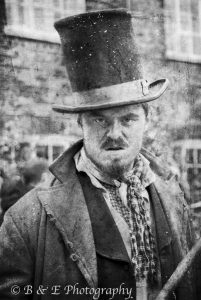
Yivenne and Tesara’s great-grandfather, back when Mederos family was still a bunch of bandits and smugglers (And yes, come to think of it, apple and tree).
From bandits to ballrooms in three generations. — folk saying of Port Saint Frey
Ned Mederos stood on the cliffs overlooking the sea, and watched his quarry turn away toward safety and the harbor. He doused his lantern. He was a tall, pale man, his watery blue eyes and reddish beard accentuated with a cruel mouth and impatient expression.
“Well,” said his companion, the rotund and genial Theo Balinchard. “That’s another one.”
Ned Mederos raised his eyes to the heavens. “Oh, is it Theo? Is it really? Do you think you could not chatter so much?”
“I’m just saying, Ned. The game has run its course. The merchant mariners all know to steer to port when they see the light. Word at Aether’s is that the town is raising money for a lighthouse on Dolphin. Head.”
January 17, 2019
Signing at BookWoman February 10, at 4 pm
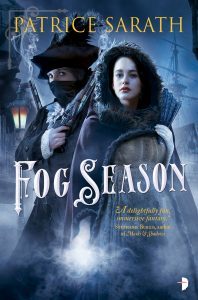 You are cordially invited to join me at bookwoman in Austin, on February 10 for a reading and signing of Fog Season. I’m really excited about this event, as bookwoman is the premier feminist bookstore in Austin, Texas and I’m so happy to be debuting Fog Season here.
You are cordially invited to join me at bookwoman in Austin, on February 10 for a reading and signing of Fog Season. I’m really excited about this event, as bookwoman is the premier feminist bookstore in Austin, Texas and I’m so happy to be debuting Fog Season here.
Date: Sunday, February 10
Time: 4 p.m.
Venue: bookwoman
Address: 5501 North Lamar #A-105, Austin, TX 78751
Please y’all come! It will be a good time.
January 4, 2019
2019 Goals and Book Tour Details
Okay, I have decided. What impossible goals have I set myself for 2019
I’m going to write a story a week, besides working on the novel. Yes, it’s insane, but I’ve been meaning to do this for years now, so why not? I waste a lot of time not writing, so I might as well use some of those lost hours.
Will I fail? That’s the whole point of stretch goals — get out of your comfort zone, and reach (or strain) for the stars.
Before I go, I need to let you know that I have set up some book signings and appearances for 2019. March and April have been set — I’m waiting to hear from the bookstore on the February signing. I’m excited to bring you Fog Season, and hope you are excited too.
Now I really have to go. The first week of January is almost over. I have a story to write. This is uncharted territory. Off I go!
December 30, 2018
Fog Season countdown: Just over a month to go
Fog Season debuts February 5 and that’s just over a month away! Where did the time go? That’s just a few short weeks away!  So if you are on NetGalley, the FOG SEASON ARC is available. Get yours now.
So if you are on NetGalley, the FOG SEASON ARC is available. Get yours now.
I introduced you to Abel Fresnel. Now I’d like you to meet Malcroft Shy.
EXCERPT
At five minutes before the two o’clock hour, a large and wide figure loomed in the doorway of the kitchen entrance of the townhouse. Yvienne remained seated at the kitchen table as the dockside thug stepped over the threshold, ducking his head under the low lintel. Albero, Mrs Francini, and Uncle Samwell ranged themselves around the kitchen, with Noe crammed into the corner, making herself small. The only one obviously armed was Mrs Francini, with a formidable rolling pin. Yvienne had her pistol in her lap, under the table.

You want this guy on your side, don’t you.
Noe’s ringleader scanned all of them with admirable aplomb that just masked a vee of concern between his eyebrows. He was a large and imposing figure, made even more imposing by his wet great cape, large boots, and broad-brimmed hat. His black eyes were keen. He was rough-skinned and tanned, and obviously had spent time at sea as well as along the docks. His nose had been broken at least once, and there were red veins alongside it that indicated a fondness for drink. He grinned, and his teeth, though yellowed, were straight, and he had all of them. He looked straight at Noe, and she shrank back in fear, all her earlier confidence drained away.
“Well, Noe,” he said. He removed his worn leather hat and slapped it against his great cape. “You brought me here. And I don’t like playing games, not with the quality. So tell me true — are we playing games now?”
“No–no,” Noe stuttered.
My turn, Yvienne thought. “How good of you to come, Mr Malcroft,” she said. “As you will soon learn, I have a proposition for you that I think you will find it prudent to accept. You halt your activities as the head of the housemaid’s ring, and work for me. If you choose not to accept –” She put her hand on the piece of paper in front of her. “I’ve called you here to say this little game of yours ends now. Noe has signed an affidavit and will swear to that effect in court that you are running a housemaid’s ring, and furthermore that you have implicated the dock boss Cramdean in your wrongdoings. That affidavit is with my lawyer. If anything happens to any of us here, or to Noe’s family, it goes straight to the Chief Constable and the courts. You can play dumb all you like, but if you try anything you will spend a great deal of time in gaol, where no doubt you will be at the mercy of Cramdean’s inside men and their boss’s displeasure .”
His expression darkened. Yvienne kept her breathing easy, though her heart was racing, and her hand on the pistol was wet with sweat. He looked straight at Noe again, and she swallowed hard.
“You stupid little cow,” he said. “You think they’ll be able to protect you? You better say your prayers, little girl, because when I get through with you, you’ll wish it was Cramdean you were dealing with.” He jutted his chin at Yvienne. “She’s nothing but a fine bit of silk and lace, playing at her daddy’s business, and she’ll turn you off at the first sign of trouble.”
Yvienne felt a great swelling of anger. “Mr Malcroft,” she said, her voice soft. “Do you know who House Mederos is?” She stood up, though he still towered over her, and she cocked the pistol and pointed it at his nose. She didn’t know who gasped — Albero, Samwell, Mrs Francini, or Noe.
It got the man’s attention most thoroughly. He was almost cross-eyed in keeping his eyes on the pistol. He held up his hands and took a step back.
“Let me remind you, Mr Malcroft, with whom you are dealing. We ruined Guildmaster Trune and drove him from this town. We took down the Merchants Guild and we restored our family to its proper place. House Mederos rid this city of the corruption and filth at the top, and there is nothing to stop us from ridding it from the filth at the bottom. Do you want to go back to Cramdean? Be my guest. But you take this message to him if you dare. House Mederos will not rest until Cramdean and his ilk are served as thoroughly as we served the Guild.
“And I am House Mederos.”
There was a thrumming silence. She could practically see the man’s calculations going on in his head as he weighed his two fates — throwing in with her or returning to Cramdean and trying to explain what had happened. After an interminable interval, Malcroft broke. He glanced down at the paper on the table.
“All right, all right,” he said, smiling an obsequious smile. “All right. No need to get hasty. How can I help House Mederos?”
She gestured with the pistol and he fumbled backward and sat down on a stool by the door, looking like a chastened and overgrown schoolboy.
“First you can acknowledge here that Noe is no longer a part of your gang and her family will face no repercussions from you.”
He glanced at Noe. Something passed between them, some communication that Yvienne could not read. He returned his gaze to her and nodded.
“Second, you work for me now, Mr Malcroft. Not Cramdean.”
She pushed the paper over to him, wondering if he could read it. He could, and she saw the comprehension in his expression as he scanned through the contract, his eyes widening at the terms. She nodded to Albero, and he produced a pen and ink. Malcroft wrote a credible signature and pushed it back over to her.
For a second there was something shrewd in his expression but it was gone in a flash. But I saw it and won’t forget, Yvienne thought. Contract notwithstanding, she had no doubt he had no intention of being bound by it. She lowered the pistol and released the hammer, and he let out his breath.
“You’ll be amply rewarded, provided that you don’t return to your old tricks,” she said. “If you double-cross me or steal anything, then we turn you over to your old master.” In response, he crossed his heart and yanked his ear. “Welcome to the team, Mr Malcroft. You are now head of security for House Mederos.”
November 26, 2018
Fog Season update
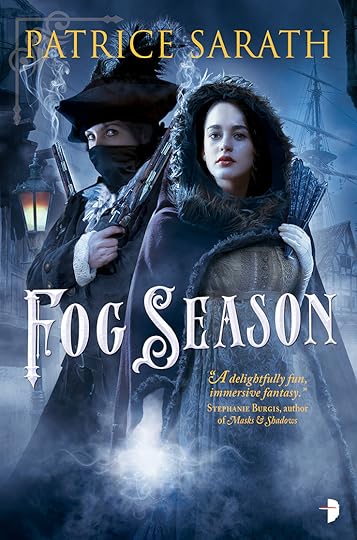 Hey everyone! This is just a reminder that Fog Season will be available on February 5, 2019. It’s not too early to pre-order a copy from your favorite bookstore or website. Angry Robot books has you covered with links to everything from Amazon to WHSmith.
Hey everyone! This is just a reminder that Fog Season will be available on February 5, 2019. It’s not too early to pre-order a copy from your favorite bookstore or website. Angry Robot books has you covered with links to everything from Amazon to WHSmith.
After our intrepid heroines restored the family’s fortunes and good name in The Sisters Mederos, they expect that things should get back to normal. Yvienne tries to go straight, taking over the family business, and Tesara tries to come to terms with her magic powers.
Then the private detective shows up, and things go sideways. Here’s a teaser with the new guy, Abel Fresnel:
A knock interrupted Abel Fresnel as he finished tying his tie at the round mirror over the cheap deal dresser. He picked up the small pearl-handle pistol on the battered dressing table and palmed it. It was a lady’s gun but no less dangerous for all that. He liked the way it felt in his hand.
He went to the door and positioned himself behind it, ready to slam it closed if he didn’t like what was on the other side.
“Who is it?”
“Front desk, Mr Fresnel. You have two letters, sir.”
Still cautious Abel opened the door. The eager clerk waited with his post, his starched collar already wilting under the pomade applied to his hair. “And may I just say, sir, how honored we at the Bailet are–”
“Thanks,” Abel said, taking the letters and closing the door on the clerk, with just enough time to see the man’s expression turn from expectant to crestfallen. One of the occupational hazards of the Harrier profession was hero worship. The least the hotel could have done was put him up in a better room, if they expected to fawn over him, he thought. The room was small, cramped, and narrow. It was little more than a sailor’s rest, but at least Abel had the place to himself. He could put the wash basin outside the door when he finished, and a maid came by and emptied it. There was a water closet at the end of the hall. Best of all, Abel was able to jigger the lock to his room so that the master key wouldn’t be able to open the door.
The first letter was an invitation to come to the Charvantes house for a meeting with the Merchants’ Guild to discuss the tenor and direction of the investigation into the criminal and civil activities of former Guild liaison P. Trune.
The other note was a letter from his mother, to idle eyes anyway. Abel ignored the florid, breathless feminine script littered with phrases about how she missed her darling son, her rheumatism, and gossip about the neighbors. He ran his fingers across the rough paper, picking up the tiny pricks and bumps of a carefully lettered code.
Contact in Port Saint Frey has identified the younger Mederos girl as an unnatural. Find her and bring her in alive. Exercise extreme caution. She is believed dangerous.
An unnatural. No wonder Doc had a special interest. The Harrier Agency was always looking for unnaturals — and if Doc couldn’t find them, he had ways to encourage the talents of his Harriers. Abel wondered if Doc had sent him to Port Saint Frey with this second job in mind or if it had come to his attention after Abel had been dispatched. The letter was undated and unfranked, meaning it hadn’t come by the mail coaches that trundled along the coast. While that passage was secure, the mail took ten days and multiple stages to carry letters between Great Lake and Port Saint Frey. Doc had sent this coded letter via the express riders who galloped their spry, lean ponies down through the Chahoki empire and across the Desert Sea. The fearless riders were able to shave the time to five days, but they were expensive, and many a letter pouch languished under the bones of a painted pony and its orphan rider, shot down by Chahoki horse soldiers wielding their fearsome repeating rifles. Doc was lucky though; his letters always got through.
This was the first instruction he had received since he had come to town two days ago. Three weeks ago a request for the services of the Harrier Detecting Agency came to Doc Farrissey’s offices in Great Lake. Doc had dispatched Abel alone, and he had made the journey via stagecoach westward through Chahoki territory and then down the coast through the Ravenne Protectorate. He had sent word to Guild headquarters that he had arrived and waited orders. This was the first they deigned to reach out to him.
Abel had not been cooling his heels for the last two days. He was a Harrier, and a Harrier always got his man, and part of that success had to do with understanding the client as well as their target. He had the kind of unassuming demeanor that made people comfortable, and he listened — to the gossip, the constables, the gents o’ the night who would ramble on for the cost of a glass of whiskey or a pint of ale. He had gleaned a lot in the past two days, and all of it would be enormously useful in both of his jobs — the one for the Guild, and the one for Doc. Because while Doc might have thought the two were completely unrelated, Abel had discovered that the Guild, the Guildmaster, and now the unnatural younger Mederos girl, were all entirely intertwined. And after meeting the self-possessed elder sister, he was more certain than ever that whatever happened during the Great Fraud, the girls had something to do with it.
When Abel was eight years old, nearly twenty years before, his father indentured him to Doc Farissey as an errand boy. A roof over his head and a trade and not too many beatings — it was the best he could hope for. He liked being told to run fast on his deliveries, and he liked threading through the crowds, his wiry little body ducking and dodging, taking all the short cuts at a sprint. He didn’t like the cursing and the beating, and he didn’t like the fact that he never had enough to eat, and he missed his mother. Once he took time out after delivering a message to one of Doc’s cronies to divert down a familiar alleyway to his old house. There he perched like a small gargoyle on top of a back wall and watched his mother hanging out clothes in the narrow strip of yard behind the house. He almost called out to her when his father saw him and gave a yell.
Abel had been so startled he fell off the wall, had the wind knocked out of him, and was caught by the old man. He got beaten twice — once by his father, who told him never to come back, that it was a breach of contract — and once by Doc.
When he was nine, he was summoned to Doc’s office. Doc was a big man, with a big stomach and a big black beard. To a kid, he was a giant. He handed Abel a thimbleful of liquid and told him to drink. For all Abel knew, it was strong spirits. He drank eagerly, thinking it was a sign that Doc would treat him like one of the big boys, and almost immediately his throat and stomach burned as if he had drunk lye. He couldn’t scream, just clawed and grasped at his throat, and when it was over and he was still alive, Doc knelt beside him and put Abel’s limp fingers around his wrist.
“What can you tell?”
“Everything,” Abel managed to whisper.
Doc chuckled. “I knew you had it in you, boy. Just needed to bring it out.”
By the time he was fifteen, he very nearly didn’t need to touch his target to know if they were hiding something. He could almost tell their very thoughts, but he usually didn’t need that much detail. Emotion, unease, small tics and changes in expression — all were as revealing as a confession.
Doc always said it took an unnatural to find an unnatural. This wasn’t the first time he had been tasked to bring in such a person of interest. Dangerous though she might be, the Mederos girl stood no chance against a Harrier.
Whistling, Abel sauntered down the stairs to breakfast in the hotel dining room.


